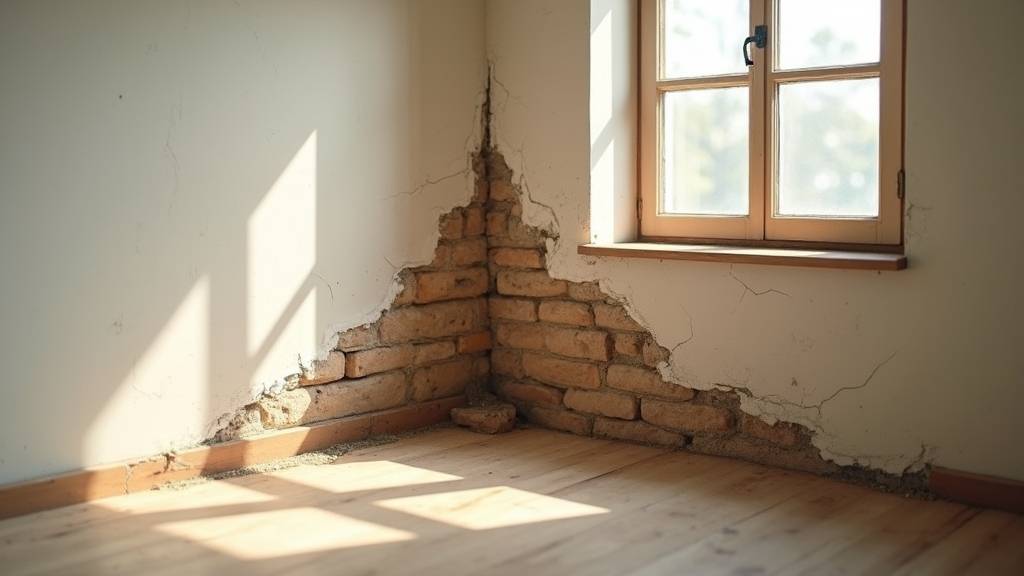Selling a house with foundation problems is stressful for any homeowner. Many buyers worry about hidden issues and unexpected repairs. This problem can lower your home’s value and make selling much harder.
Foundation problems can scare buyers away fast. Home inspections can reveal costly repairs, making buyers doubt your home’s safety. You may face lower offers or failed sales if issues are found. Home inspections can make or break your sale when foundation problems are involved.
You can prepare by understanding what inspectors look for and fixing issues early. This helps you avoid surprises and build buyer trust.
This blog will guide you through handling inspections and selling with foundation problems, so you can achieve a smoother sale.
Key Takeaways
- Home inspections reveal foundation issues, requiring sellers to disclose problems and provide repair documentation to potential buyers.
- Inspection findings often prompt price negotiations or repair requests from buyers concerned about safety and future repair costs.
- Serious foundation problems uncovered in inspections can lower property appraisals and complicate mortgage approval for buyers.
- Visible foundation defects noted in reports can discourage buyers or result in reduced offers and longer selling times.
- Inspection reports help buyers assess risk, influencing their trust, confidence, and willingness to proceed with the purchase.
Understanding Foundation Problems in Residential Properties

Foundation problems in homes are more serious than small cracks or normal settling. These issues can weaken the structure and lower your home’s value. You should know the warning signs to protect your property. Serious foundation issues go beyond minor cracks and settling—they can weaken your home and reduce its value if left unchecked.
Basement leaks that do not stop can mean water is damaging the soil under your foundation. If water keeps getting inside, the foundation may shift or sink. This can lead to expensive repairs later. Recognizing water intrusion issues early can save money and prevent further damage.
Walls that bend or curve inward are also a warning sign. Bowed walls often happen when wet soil pushes against the foundation. If you ignore this, the problem will get worse with time.
Sloping floors or doors that stick can show that the foundation is moving. If you notice these changes, the structure may not be stable. Taking action early can prevent further damage.
Understanding professional inspection and timely repairs can help identify hidden issues before they worsen. If you understand these signs, you can keep your home safe. Early repairs help maintain the value and safety of your property. Always check for these issues to avoid bigger problems.
The Role of Home Inspections in Real Estate Transactions
Home inspections are important in real estate deals because they reveal a home’s true condition. Both buyers and sellers rely on these reports to avoid surprises. Inspections often focus on key areas like the property’s foundation.
A professional foundation check shows if the structure is sound. If problems appear, both parties can discuss repairs or price changes. This step helps everyone make informed choices before finalizing the sale. Having a clear understanding of property condition can prevent costly surprises later.
Buyers usually feel hopeful before the inspection. Sellers may feel anxious about possible issues. During the inspection, both sides can feel nervous about what might be found.
If inspectors find no major problems, buyers feel relieved. Sellers can feel prepared if issues do arise. Negotiations often follow, with buyers feeling empowered and sellers sometimes defensive.
After inspection, buyers tend to feel confident about their decision. Sellers are usually resigned to any needed changes. Overall, inspections build trust and help both sides move forward. Understanding property condition is essential for a smooth transaction.
Common Foundation Issues Identified During Inspections

Home inspectors often find foundation problems that most homeowners miss. They look for cracks, uneven floors, and sticking doors. These signs often mean the foundation is shifting or settling.
Inspectors also check for gaps near windows and sloping floors. Water in basements or crawl spaces is another warning sign. If these problems exist, the home’s stability could be at risk.
Common foundation issues include cracks, bowed walls, and moisture damage. These problems might need repairs to prevent further damage. If you fix issues early, you can avoid bigger repairs and selling delays.
How Inspectors Assess Foundation Integrity
Inspectors check a home’s foundation to see if it is safe and stable. They look for signs of damage and movement. This process helps you know what to expect when selling a house. The first step is a visual check. Inspectors look for cracks, uneven floors, and doors that do not close properly. If they find these issues, deeper problems may exist.
They also examine the soil around the house. Loose or shifting soil can make the foundation less stable. Good soil drainage is important for a strong foundation. Next, inspectors may use tools to measure how much the foundation has moved. These tools help find hidden problems. Their report can affect your sale price and how quickly you sell. Additionally, understanding foundation condition can assist sellers in making informed decisions about repairs or price adjustments.
Red Flags That Raise Buyer Concerns

When buyers spot visible cracks and gaps in your walls or foundation, they immediately question the home’s structural stability. Uneven floors and signs of moisture or water intrusion only heighten their concerns, signaling potential costly repairs. You need to understand how these red flags can significantly impact buyer confidence and offers.
Additionally, the presence of foundation issues or water damage can complicate the sale process, as they often require professional assessment and remediation before a transaction can proceed smoothly. Being aware of land contract restrictions and ensuring proper legal steps are taken can help mitigate some of these concerns during negotiations.
Visible Cracks and Gaps
Visible cracks and gaps are easy to notice in a home. Buyers often see them as warning signs of bigger problems. These flaws can make buyers worry about costly future repairs.
Home inspectors always check cracks in walls, ceilings, and foundations. If a crack is large or runs in a certain direction, it may show a serious issue. Small gaps around windows or doors can also suggest the house is shifting.
If you fix these problems before selling, buyers may feel more confident. Unrepaired cracks can lead buyers to lower their offers or walk away. Taking care of repairs shows you are responsible and helps you keep your price.
Uneven Floors Detected
Uneven floors are often signs of foundation problems. If you see sloping or sagging floors, the house may have structural issues. Home inspectors treat uneven floors as key warning signs.
Buyers worry about the cost of fixing these problems. Uneven floors can mean expensive repairs are needed. If the foundation is bad, the home could be unsafe.
Foundation issues may also lower resale value. Buyers might worry about selling the house in the future. Uneven floors can also hide other problems that are not visible.
Moisture and Water Intrusion
Moisture and water intrusion can show bigger problems with a home’s foundation. Home inspectors look closely for any signs of water issues. Signs like dampness, stains, and standing water can warn of expensive repairs.
Inspectors check if water is being moved away from the house. They look at downspouts, grading, and drainage systems. If water collects near the foundation, it may cause damage over time.
Buyers may worry if they see damp basements, musty smells, or water marks. These issues can mean mold or hidden problems. Any sign of poor drainage can make buyers hesitate.
Here are some indicators and what they mean:
| Indicator | What Inspectors Look For | Buyer Concern |
|---|---|---|
| Basement humidity | Dampness, musty odors | Mold, hidden damage |
| Water stains | Discoloration, streaks | Past or future leaks |
| Poor water drainage | Pooling near the foundation | Foundation problems |
Inspection Reports: What Sellers Need to Know
Inspection reports are important when selling a house with foundation problems. These reports explain what is wrong and what needs fixing. Sellers need to understand the main points to handle negotiations and legal duties.
Inspectors describe foundation settlement and soil issues in detail. They include photos and diagrams to show what they found. If the report mentions urgent repairs or safety risks, sellers should take these seriously.
The report’s structure can affect what you must tell buyers. If a finding is legally required to be shared, you must disclose it. Knowing these details helps you respond to buyers’ questions and plan your next steps.
Additionally, documenting foundation issues ensures transparency and builds trust with potential buyers during negotiations. Proper documentation can also help you calculate potential repair costs and understand the impact on your property’s value.
The Impact of Foundation Findings on Property Value
When a home inspection uncovers foundation problems, you’ll likely face price reductions and tough negotiations, as buyers factor repair costs into their offers. These findings can also shake buyer confidence and trust, making them hesitant to move forward.
Appraisers and lenders may scrutinize your property more closely, potentially complicating the loan process and impacting your home’s final value. Additionally, selling a house with foundation issues often means dealing with as-is transactions, which can streamline the sale but may also result in lower offers. Having a clear understanding of the local real estate market and professional guidance can help navigate these challenges more effectively.
Price Reductions and Negotiations
Foundation problems usually lead to lower home prices. Buyers often offer less when inspections show serious foundation issues. If you want to sell, be ready for price cuts.
Most buyers will factor in repair costs. They may ask for a credit at closing to help pay for repairs. Some buyers add a clause that lets them back out if repairs cost too much.
Foundation issues limit your pool of buyers. If fewer people are interested, you might have to lower your price further. Quick sales usually require flexible pricing when the foundation is damaged.
Buyer Confidence and Trust
Buyer confidence and trust can drop when foundation issues are found. Buyers often see these problems as serious and risky. They may fear extra costs and future resale troubles.
A home inspection that reveals foundation movement can cause doubts. Buyers may think there are deeper, hidden problems. This can make them hesitate or even leave the deal.
If you want to keep buyer trust, share clear repair records. Good communication about repairs or inspections is important. This helps show your home is stable and safe.
Appraisal and Loan Challenges
Foundation problems can make it harder to get a good home appraisal or a loan. Appraisers lower the home value if they see foundation damage. Lenders may refuse loans until repairs are made.
If the inspection shows settlement or poor soil, the appraised value usually drops. Some lenders will only approve mortgages after expensive repairs. FHA and VA loans may not allow homes with soil or foundation issues.
Buyers might need a bigger down payment to get loan approval. These challenges can delay or block a home sale. Knowing this helps you plan better when selling your home.
Disclosure Requirements for Foundation Problems
If you are selling a house with foundation problems, you must tell potential buyers. Most state and local laws require this disclosure. Hiding issues like cracks or repairs can lead to legal trouble later.
Sellers need to share any professional reports or repair records. These documents should mention completed repairs and advice from experts. If you have improved the soil or reinforced the foundation, include those details. Providing fair cash offers and transparent disclosures can help build trust and ensure a smoother transaction. Additionally, maintaining accurate documentation supports your claims and can prevent disputes during closing.
Clear records help buyers trust you. If buyers see honest disclosures, they may feel more comfortable moving forward. Disclosing early can also prevent delays in the sale.
Here is an example of what you might share:
| Problem Identified | Professional Assessment | Action Taken |
|---|---|---|
| Foundation cracks | Structural engineer | Soil stabilization |
| Uneven floors | Home inspector | Foundation reinforcement |
| Water intrusion | Contractor | Drainage improvements |
| Settling | Engineer | Pier installation |
| Past repairs | Repair specialist | Documentation provided |
If you disclose problems early, there will be fewer surprises for buyers. Early honesty can help the sale go smoothly.
Negotiating Repairs After a Foundation Inspection
After a foundation inspection finds problems, both buyers and sellers need to talk about repairs. The main issues are settlement and stability. Each side wants to protect their interests in the deal.
The inspection report should be reviewed to see the exact foundation problems. If you need more details, ask licensed pros for repair estimates. Accurate estimates show how much repairs might cost.
Buyers can ask for a lower price or credits if repairs are needed. Sellers might agree to fixes or offer concessions. Clear documents and honest talks help both sides understand the risks.
If one party is unsure, they can set post-inspection conditions. These conditions keep everyone safe during the sale. Both sides should agree on what happens if repairs are bigger than expected. Sell Your House Without an Agent
Additionally, understanding the co-ownership structure can influence how repairs and negotiations are handled, especially if multiple owners are involved in the sale process.
Repair Options and Cost Considerations
You’ll need to weigh several foundation repair methods, such as pier and beam adjustments, slab jacking, or installing steel piers, each with its own pros and limitations. It’s crucial to get detailed estimates from qualified contractors, as costs can range from a few thousand dollars for minor fixes to tens of thousands for structural repairs. Understanding these options and associated expenses helps you make informed decisions before listing your home.
Common Foundation Repair Methods
Foundation problems are common, but there are reliable ways to fix them. The right repair method depends on what is causing the damage. Homeowners should know the main options before choosing a solution.
Piering and underpinning use strong supports placed deep in the ground to steady the foundation. If your house is sinking, this method can lift it back into place. Contractors often use steel or concrete piers for this job.
Slabjacking can raise a concrete slab that has sunk. Professionals pump a special material under the slab to fill empty spaces and lift it. This works well for sunken driveways, patios, or sidewalks.
Soil stabilization is needed if the ground under your home is weak. Specialists may replace or treat the soil to help it support the house. This can prevent future settling and cracks.
Wall anchors and braces help if basement walls are bowing or cracking. These tools hold the walls firmly and stop them from moving further. If you see wall cracks, this may be the best fix.
Choosing the right repair keeps your home safe and valuable. If you are unsure, ask a professional for advice. Correct repairs protect your home in the long run.
Estimating Repair Expenses
Foundation repair costs depend on the problem and the solution needed. Simple crack repairs are less expensive than major fixes. Bigger repairs, like stabilization or reinforcement, cost much more.
Crack injections may only cost a few hundred dollars. If your home needs piers or underpinning, each pier can cost $3,000 to $10,000 or more. Adding steel beams for support can also add several thousand dollars.
Homeowners should always get quotes from licensed contractors. Ask for itemized costs to avoid surprises. If you understand the repairs needed, you can plan your budget and talk confidently with professionals.
How Foundation Issues Affect Buyer Financing
Foundation problems can make it hard for buyers to get a home loan. Lenders see these issues as a risk to their money. If the foundation is not stable, a buyer’s financing may fall through.
Foundation issues often make it difficult for buyers to secure a home loan, as lenders view unstable foundations as a financial risk.
Lenders may ask for a report from a structural engineer. This report checks the severity of foundation damage and soil movement. Without it, the lender could deny the loan.
Most loan programs, like FHA or VA, will not approve homes with foundation problems. Appraisers might lower the home’s value if they spot these issues. This can change the amount a lender is willing to give.
If the foundation is not fixed, buyers may need a larger down payment. Some buyers might have to look for different types of loans. These options can be more expensive and harder to get.
Strategies for Marketing a Home With Foundation Problems
Selling a home with foundation problems can be difficult, but you can still find interested buyers with the right strategy. If you market the home honestly and highlight its strengths, you may attract investors or renovation-minded buyers.
Curb appeal is important, even with known issues. A clean yard, trimmed bushes, and fresh flowers make a good first impression.
Inside the home, clean and declutter every room. If you stage the home, use furniture to show off space and natural light. This helps buyers see the home’s potential.
Always mention the foundation problems in your listing. If you focus on positives like location or recent updates, buyers may look past the flaws. Be honest, but show what makes the home a good opportunity.
Working With Real Estate Agents on Disclosure and Pricing
Working with real estate agents means sharing all important information about your home, especially if there are foundation issues. Honest marketing helps build trust between you and your agent. Clear and complete disclosures are necessary for buyers to understand the home’s condition.
A certified structural assessment can give buyers confidence in your home’s safety. If you have records of foundation repairs, provide these to your agent. Your agent will use this information to help set a fair price.
Pricing should consider the cost of any needed repairs and the current market. Marketing materials should mention both the home’s problems and possible solutions. If you follow these steps, you can attract serious buyers and avoid future disputes.
Weighing the Pros and Cons of Selling As-Is
When you sell your house as-is, you can often close much faster, but you’ll mainly attract investor buyers rather than traditional homeowners. These buyers expect a discount that reflects both the foundation issues and the risk they’re taking on. Weighing the potential for a strong sale against likely lower offers is crucial before you decide on this route.
Speed of Transaction
Selling a house as-is often speeds up the transaction process. You can move to closing sooner, especially if there are foundation issues. This method helps you avoid delays caused by repairs.
If you choose to sell as-is, you skip most repairs and long inspections. Buyers accept the home’s current condition, so you face less negotiation. This can make the process much faster.
As-is sales usually have fewer contingencies. Deals are less likely to fall through. If you have disclosed all foundation problems, misunderstandings about warranties or repairs are less likely.
Clear communication about the home’s condition keeps the process simple. If transparency is maintained, transactions are usually straightforward. This approach benefits sellers who want a quick sale.
Attracting Investor Buyers
Selling your house as-is with foundation problems will mainly attract investor buyers. Most regular homebuyers avoid houses with major repairs. Investors have the skills and money to fix these issues.
If you sell as-is, you can avoid making expensive repairs. This will likely lead to lower offers from buyers. Investors often look for deals and may offer less than the home’s market value.
A quick sale is possible since investors can pay cash. You will have fewer showings and less negotiation. However, you may have less control over the final price.
Selling as-is can feel relieving because you skip repair stress. The buyer pool is smaller, so you may get fewer offers. If you need to sell fast, this option could work, but expect lower bids.
Pricing Considerations
Setting the right price is important when selling a home with foundation problems. The price should reflect the home’s condition and current market trends. If you price too high, buyers may lose interest.
Sellers should look at recent sales of homes with similar foundation issues. These comparisons can help decide a realistic price. If there are no similar sales, estimate the value by considering repair needs.
You should subtract the expected repair costs from your home’s value. Buyers usually expect discounts to cover their risks. Investors may ask for a bigger price cut.
If you are unsure, ask a real estate agent for advice. Agents who handle homes with problems can help set a fair price. Their experience can help you get the best possible return.
Conclusion
If you plan to sell a house with foundation problems, a home inspection can shape the entire process. If you are honest and well-prepared, you can avoid surprises and set realistic expectations for everyone involved. If you are upfront, buyers are more likely to trust you and proceed with the sale.
If you want to sell quickly, you might consider selling to a cash buyer. We buy houses for cash, no matter the condition or foundation issues. If you sell to us, you can avoid repairs and close on your own timeline.
If you are ready to move forward, Freedom Path Investors can help. We make the process simple and stress-free for sellers. Contact us today to see how we can help you sell your house fast.







